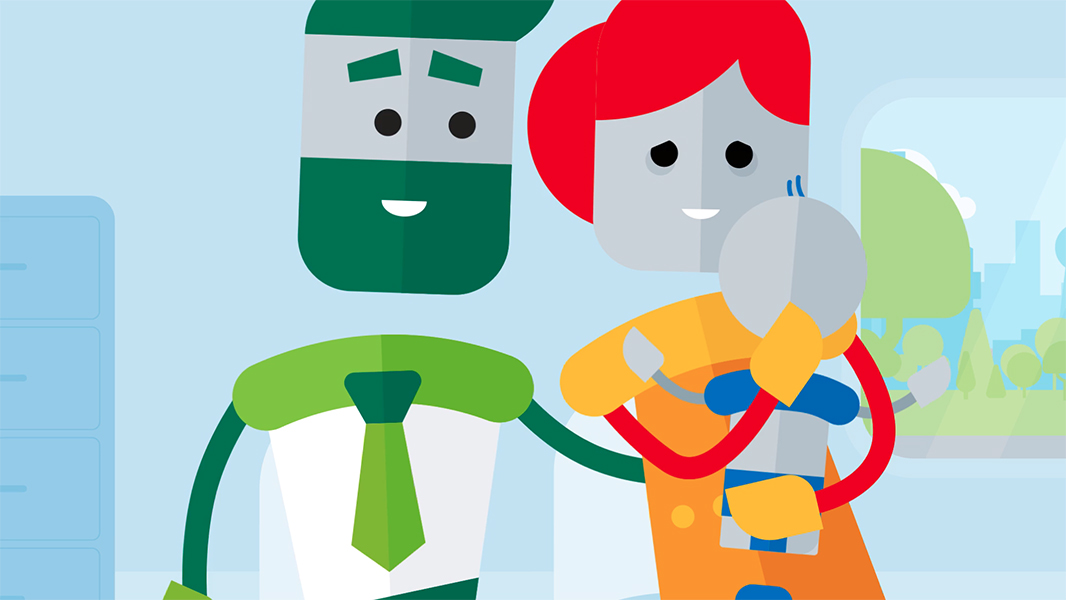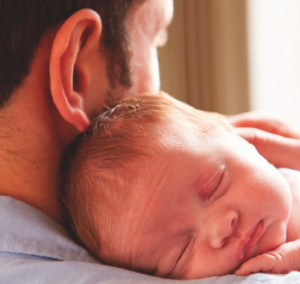
It can be hard to imagine the impact that having a baby will have on you. Caring for somebody 24 hours a day, every day, is a huge responsibility. Perhaps you have changed from being a single woman or a couple to becoming a family; you’ll need time to adjust to this. If you’ve a child already you may be surprised by how much impact another baby has on your family and your feelings of coping. Spending a lot of time alone with the baby can be all-consuming.
Some women fall in love with their babies from the moment of birth, and some women find that their love grows slowly over the first few weeks as they get to know and care for their baby. Both ways are normal. If you don’t feel anything at all for your baby, or are worried about how you’re feeling, talk to your midwife, health visitor or GP.
Below you will find some useful pointers for how to deal with the difficult emotions you might experience as a new parent. You can also download this leaflet for more on the types of mental health concerns you may experience and why.
If you are a parent at a different stage in your child’s life, please visit the Maternal and Paternal Mental Health page for guidance on when to get help and where. You can also see the ‘Further information’ section at the bottom of this page for more resources.
 Frightening thoughts – for example about hurting your baby; these can be scary, but they’re very rarely acted upon.
Frightening thoughts – for example about hurting your baby; these can be scary, but they’re very rarely acted upon.If you (or someone close to you) are worried about how you’re feeling, talk to your health visitor, midwife or doctor. They will be able to discuss with you what could be done to help. This may include talking to a therapist, a referral to a mental heath team, support/social groups or antidepressant medication, all of which can help you to feel more able to cope with you difficult feelings.
You’re more likely to feel better if you seek support. Asking for help is best for you and your baby. It won’t make you a bad mother and it won’t mean you’ve failed. Whether you feel a little low or you’re wondering whether you’ve postnatal depression or anxiety it’s important to take care of yourself. Taking care of yourself will make things better for you and your baby.
Rest is vital for keeping you healthy. What activities do you find truly restful? When could you do one or two of them?
Wear warm clothes and make sure you’re sitting or lying comfortably. Start by breathing slowly in through your mouth. Often when we’re not relaxed we breathe quickly. Slowing our breathing can gradually help us feel better.
To help check how deeply you’re breathing place one hand on your stomach and one on your chest. As you breathe in feel your stomach swell outwards, filling with air and try to keep your chest still. Repeat the deep breaths three times. Close your eyes and begin to visualise a calm scene. See the beauty of the colours of the sky, there is no wind, no sound, complete calm. Allow your mind to create this scene for you, it may be somewhere you know or a place you have created. Allow yourself to relax with this image for a few minutes, keeping your breathing deep and slow. Then stretch your fingers and toes and allow yourself to become aware of the room you’re in once again.
Gentle exercise can help you feel less worn out and sleep better. Taking the baby for a walk is good for you both. Also, ensuring you’ve a balanced diet can help to reduce feelings of depression, especially if you’re breast feeding.
Sharing your worries and difficulties can ease the pressure they put on you. This could be with a friend, family member, health visitor, midwife, doctor, counsellor or therapist.

Letting other people help with the chores will reduce some of the pressure on you.
Holding your baby against your skin will give you the chance to rest and get to know each other. It can help with bonding, releases oxytocin in both of you, which can help you both feel happier, calmer and safer.
Building a network of other mums allows you to talk to people who understand about the experiences you’re having and will help you feel less alone.
Notice the feelings you’re having and think of ways to let them out. These may be crying, laughing, drawing or writing.
Sleeping when your baby sleeps is a good way to get rest. A trusted friend or family member could look after the baby one night so you can get a much needed full night’s sleep.
Take time to do something for you, for example, a bubble bath, a trip out, see a friend. It’s not selfish and everyone can benefit.
This method has one simple rule – exhale for double the amount of time you inhale. Put simply, if you breathe in and count to four seconds, you should then slowly exhale and count to eight seconds as you do it. By following this technique, it slows down the heart rate and relaxes the muscles, similar to when the body rests or sleeps and ultimately restores calm.
Communicate Talking with your partner, friends or family member about how you’re feeling can help your relationships. Using ‘I’ instead of ‘you’ statements can help, e.g. saying ‘I feel I am doing more than my fair share’ could be more productive than ‘you’re not doing enough’.
If you’ve a partner talk to him/ her about who is responsible for which household and baby jobs to reduce the risk of feeling resentful towards each other. Also, by accepting help from other people you and your partner can have a chance to be alone together to enjoy each other’s company.
If you’re experiencing physical or mental abuse talk to your health visitor or contact Women’s Aid.
Treat each day as a new day. Look at a new day as an opportunity to start afresh, if things have been difficult or overwhelming the day before.
A small number of women experience very serious symptoms after their birth including: hallucinations, highly irrational thoughts or extreme agitation. If you’ve these problems it’s very important to seek help immediately by contacting your GP, health visitor or midwife. If you live in Bradford, Airedale, Wharfedale or Craven and are experiencing a mental health crisis, please call our First Response service on by calling: 0800 952 1181. This service is for people of all ages, 24 hours a day, seven days a week. If you live in Wakefield and are experiencing a mental health crisis, please call: 01924 316900, any time.






